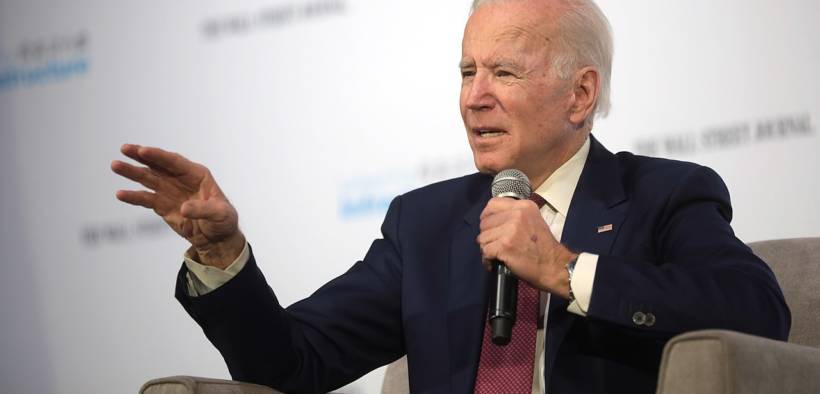2020 Has Been a Disaster for National Progressive Politics (and Pretty Much Everything Else)


Speaking as a progressive, the fight for economic, political, and social justice is such that, despite any setbacks, there are always more battles to fight. In other words, there is always work to be done and voices to be amplified. But damn if it doesn’t get disheartening sometimes.
Of course, as the death count related to COVID-19 in the United States makes its inexorable climb toward 100,000-plus, the immediate health and safety of all Americans is of paramount importance. Still, taking a snapshot of progressive politics at this moment in time, it’s worth noting that, at the national level, progressive leadership and power doesn’t seem all that it’s cracked up to be or could be.
Let’s start with the Senate. Who are your progressive leaders and how do you feel about them lately? Bernie Sanders, who has missed at least one key vote in recent memory, is reportedly asking some delegates to sign agreements barring them from attacking other candidates or leaders, getting involved in social media confrontations, or doing interviews with reporters without approval. If true, it’s a disappointing development from a man who suspended his presidential bid with a whimper and gave up the fight with so much at stake and with so little conceded from Joe Biden’s camp.
Elizabeth Warren? After a disappointing campaign that ultimately saw her fail to catch on with progressives and party loyalists alike and only manage a third-place finish in her home state, her progressive credentials are in question now more than ever. Her attacks on Bernie, her reversal on super PAC funding, and her self-identification alongside Amy Klobuchar from primary season notwithstanding, her apparent abandonment of Medicare for All, a central tenet of the progressive movement in the U.S., invites charges of selling out for a chance to be Biden’s vice president—an unlikely eventuality to begin with given Joe’s ties to the banking industry.
Kamala Harris? Kirsten Gillibrand? Cory Booker? Like Sanders and Warren, they’re all carrying water for Biden despite a credible sexual assault allegation against him and other claims of unwanted touching or close physical proximity. Poor Ed Markey might not survive a primary challenge from Joe Kennedy III, the Pete Buttigieg of the Senate Democratic races—and no, that “Mayo Pete” comparison is not a compliment. Jeff Merkley. Mazie Hirono. Sherrod Brown. They’re not exactly household names outside of progressive circles and none are younger than 60.
In the House of Representatives, meanwhile, we thankfully have members who are making a name for themselves as progressives on the national stage—and younger ones at that. The problem here is that these reps are seemingly having their influence circumscribed at every possible turn (or at least the attempt is there) by Speaker Nancy Pelosi and other dyed-in-the-wool establishment Democrats.
Faced with an unprecedented economic and health crisis, Pelosi and Co. have largely capitulated to moneyed interests, offering little in the way of substantive relief to everyday Americans beyond the minimum standards Republicans have proposed. All the while, Pelosi, like her other moderate colleagues, has endorsed Biden’s presidential bid and has allowed herself to get dragged down in the mud with Donald Trump, making references to his weight and other performative gestures which neither do anything to help people in need nor do they help rally support for the party cause outside of loyalists (and also risk alienating people who don’t take kindly to body shaming regardless of the source).
To recap then, we have a promising group of younger progressives in the House amid Democratic Party control, but old-guard leadership is evidently determined to thwart them as part of a last-gasp effort to flex its might. In the Senate, Mitch McConnell is majority leader, Chuck Schumer is the party’s face, and even the members with the best voting records have made questionable alliances/decisions of late. In addition, as alluded to, the most progressive options of the 2020 presidential campaign saw their hopes dashed in dramatic fashion following Super Tuesday.
All of this on top of a coronavirus crisis that has seen tens of thousands of Americans die, millions of people file for unemployment and/or lose health insurance, and the world’s richest individuals get even richer as a direct result of the global pandemic has made the first half of 2020 so far a little frustrating, to put it mildly. What’s more, it doesn’t appear things will improve over the rest of the year or anytime soon for that matter.
Small businesses will continue struggling to survive in the absence of needed aid from the federal government. Another wave of COVID-19 infections is probable if not certain. And while Biden is enjoying a national polling lead in some cases of eight or more percentage points, that he’s not doing better given the depths of Trump’s inadequacies and that he continues to lag behind in the enthusiasm department is deeply troubling with November fast approaching. In short, 2020 has sucked royally—and for progressives in particular, there is every reason to worry the worst is yet to come.
Lest I relegate myself purely to the realms of doom and gloom, it’s not all bad for the progressive movement in the United States of America. If the popularity of figures like Alexandra Ocasio-Cortez is any indication, it’s that there is a real appetite for new leadership within a growing subset of the left-leaning electorate. As ignominious as the end to Bernie Sanders’s 2020 campaign was, too, exit poll after exit poll showed that despite primary voters’ preference for Joe Biden to take on Donald Trump, on issues like Medicare for All, they favored the progressive position over the standard alternative. So many voters are desperate for real change.
As the late great philosopher Tom Petty once said, however, the waiting is the hardest part. Whilst progressives helped organize a campaign for Bernie that was poised to go the distance—and there’s much to discuss in the postmortem period of analysis about why it didn’t but there’s not enough space in this article or perhaps one article in it of itself to do that—the Biden campaign struggled to raise finances, limped out of the gates in early contests, and didn’t even have a presence in a number of bygone primary states.
And yet he still romped in the South and managed numerous upset wins following his dominant showing in South Carolina. Whether Elizabeth Warren’s presence in the race long after it was clear her electoral chances were dead on arrival hurt Bernie is yet a subject of debate in leftist circles (among Sanders supporters, I feel like this may be overblown), but regardless, the two best candidates to ever be in striking distance of the overall polling lead came up well short of winning the nomination despite being better-funded and better-organized than the campaign that actually has Biden on a path to win the Democratic Party nomination and maybe even defeat Trump in November. That’s a tough pill to swallow, and increasingly so as real life proves candidates like Sanders, Warren, and even Andrew Yang on the topic of universal basic income right.
The news is better further down ballots, where there are real electoral successes to be found. AOC’s meteoric rise to prominence aside, though, primary challenges ending in progressive wins are fewer and farther between than eager leftists sifting through voting results would obviously like to see. The Democratic Party establishment has been more than hostile toward primary challenges from the left. (If you’re Ed Markey and facing a challenge from the right in the form of a corporate-funded candidate with the Kennedy name, that’s apparently fine.) Though this doesn’t mean that challengers’ efforts aren’t worthy if not necessary to compel Democratic incumbents to actually try to earn their votes, it’s nonetheless deflating when effort and good intent alone can’t overcome voter aversion to change and a party apparatus specifically constructed to quell dissent.
Inherently, these circumstances promote tension, for while progressives ideally would like to think about how to organize over the long term, the realities of the short term compel action even at the expense of immediate political capital. Regardless of the “color” of one’s district, someone should be running to represent policy goals like Medicare for All, the Green New Deal, a $15 minimum wage, cancellation of student debt, universal basic income, and other progressive priorities. No one wants to be running without a genuine chance at winning when the optics surrounding a landslide loss loom large. The need for involvement at the lower levels of government because of the magnitude of suffering for millions of Americans creates urgency, and progressive groups across key voting blocs are often fighting one another for relevance when cooperation should be the order of the day.
For me, what is especially challenging about all of this is how, despite progressives’ collective efforts since the 2016 election, we yet find ourselves in a precarious position. After Hillary Clinton’s defeat, Democrats haven’t learned their lesson, that much more determined to return to the days before President Trump no matter what in coalescing behind a candidate in Biden who generates even less enthusiasm than the woman who just lost.
Regarding COVID-19, America lags behind the rest of the world in curbing the spread of infection despite its wealth of resources, and at a time when we should be rethinking the role of capitalism in how our society functions (or doesn’t), some people seem only that much more willing to sacrifice others on capitalism’s altar so they can get a haircut or prevent a decline in stock prices. If there is a lesson to be learned herein, it’s sadly that 90,000 deaths is not enough to spur a movement of sufficient size toward fundamental change. A few months into widespread quarantines across the country, many of us are restless to the point of advocating for armed rebellion. What happens when the ravages of climate changes really start hitting home? If current developments are any indication, it, um, won’t go well.
In belaboring progressives’ struggles within the Democratic Party, I don’t mean to paper over the differences between the Dems and the death cult that is the Republican Party. For example, Joe Biden deserves your vote more than Donald Trump—full stop. I also don’t mean to insist that leaving the Democratic Party altogether is necessarily the correct tactic. The #DemExit movement is fraught with its own difficulties and potential shortcomings, though I also don’t blame progressives for wanting to move on after the litany of abuses they’ve suffered in such a short time, only wanting to do their part to make the Democratic Party better.
Though I think progressives might do well to place a greater emphasis on winning and grassroots organizing at the lower levels of government and though I have reservations about watching the Democratic Party burn to the ground, politics is ultimately a two-way street. Democratic leadership would do well not to take progressive votes for granted and offer at least some meaningful concessions to the left rather than mere table scraps. 2020 has been a disaster for progressive politics on the national stage thus far, but it doesn’t have to end that way—and the Democrats would be all the stronger by recognizing it.







